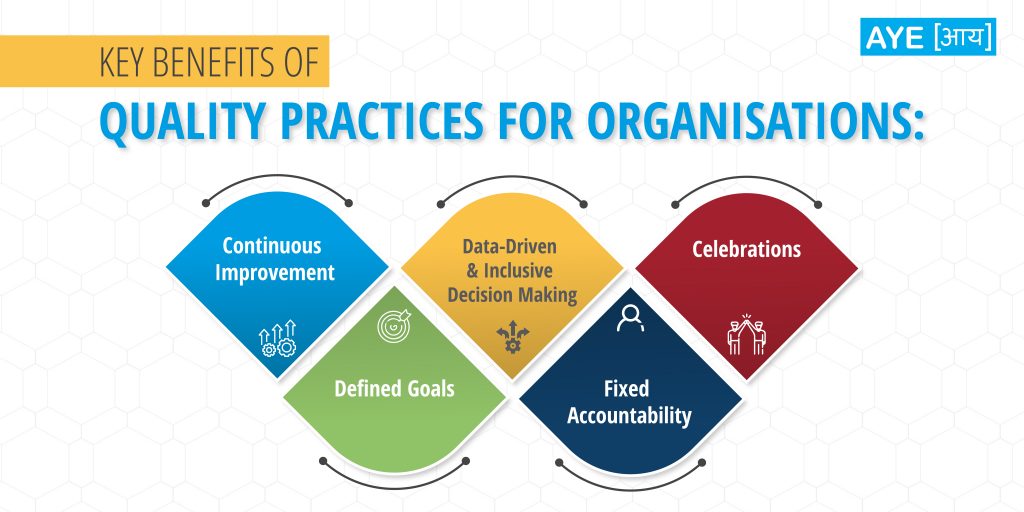“Standing still is the fastest way of moving backwards in a rapidly changing world”—Lauren Bacall.
In the physical world, the law of entropy highlights the gradual loss of order in a system. The same rule applies to business processes. Unless we invigorate the process with continuous improvement, process controls and innovations, business processes will most likely degrade over time. Quality Practices help invigorate business processes.
Quality is a way of doing things, a doctrine that is practiced. At an activity level, this practice helps identify a problem or an opportunity (or a set of them), evaluates the current state of that/those problem/s or opportunity/s, searches and finalizes for the desired state (based on the internal and external environment),lists all possible routes to travel from the current state to the desired state by causal analytics, chooses the relevant path by applying impact analytics, walk the chosen path and continuously check whether we are reaching the milestones towards the desired destination.
The practice of quality is a continuous journey and not an end in itself. For instance, after achieving a current goal, quality practitioners need to start looking for another problem to solve or another opportunity to explore. One of the defining facets of quality practice is that there is always room for improvement.
Systemic Benefits that An Organisation Gets through Quality Practices
Practicing quality methodologies helps us with some direct benefits:
Continuous Improvement: Quality practices help us to instil in the culture of an organisation to look at every problem as an opportunity and seek continuous improvement.
Data Driven and Inclusive Decision Making: These practices encourage factual, data driven and inclusive decision making.
Fixed Accountability: Quality practices are delivered through projects where members have clear roles and responsibilities around various aspects of the project.

Defined Goals: These projects define the destination through measurable goals. These goals are nothing but stated or implied aspirations of the customer (both internal and external). While setting these goals, a detailed benchmarking is also desirable.
Celebrations: Quality practices encourage celebrations as we achieve various milestones of the project.
“If somebody describes the future and it does not sound like science fiction, it is certainly false, change itself is the only certainty” — Yuval Noah Harari.
The Department of Quality has been introduced within Aye Finance at the perfect time in the organization’s journey. Over the past few years, the organization has grown in leaps and bounds. We now have a critical mass of data along with a substantial number of processes and subprocesses that necessitates us to embark in the journey of continuous improvement program.
The Quality Department will deploy the program across the length and breadth of the organization and will galvanize the usage of various tools and techniques of quality practices. It will also partner with all departments to help deliver the departmental objectives on improvement and innovation around Service, Process and Product Quality.
We will deliver the above through people, by empowering every individual with various quality methodologies, tools, techniques and providing opportunities for continuous learning and upskilling.
Written by Avijit Roy, AVP – Quality, Aye Finance

With over 2 decades of work experience in the BFSI sector including NBFC, Insurance Organisation, Indian and Foreign Banks, Avijit Roy comes with semi-entrepreneurial experience in the MSME sector. As a Certified Quality Practitioner, he has participated significantly in the quality journey of organisations while actively playing multiple roles within the quality framework in various successful projects.










